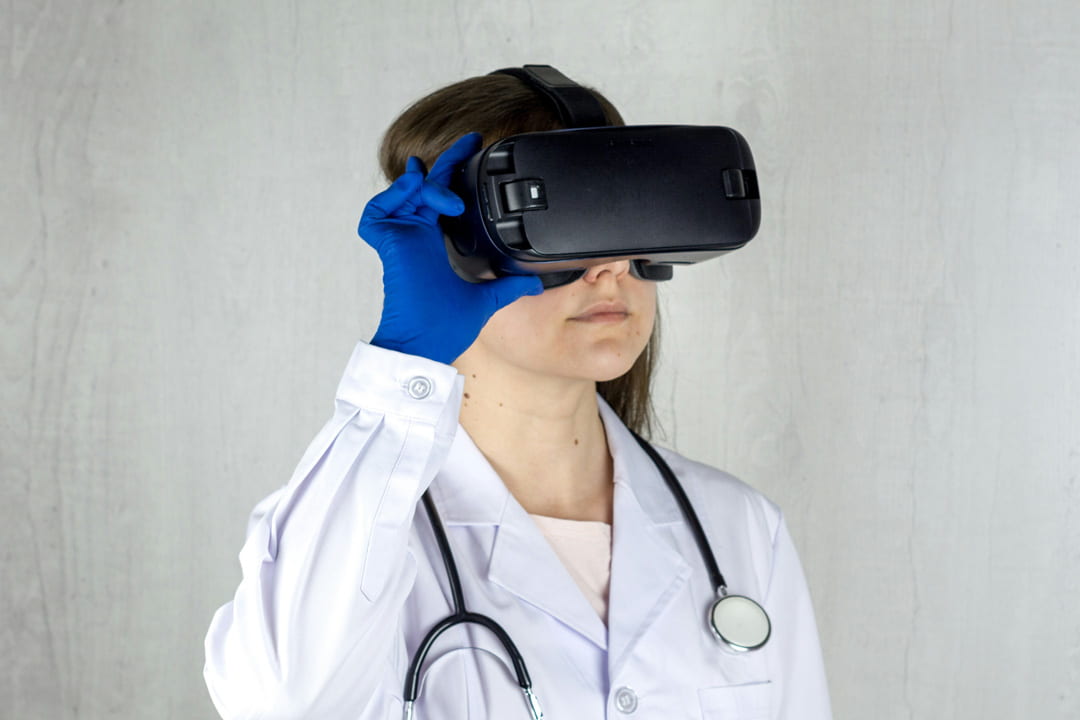Training courses and workshops
Our portfolio of courses and workshops has been developed to reflect the needs of learners working in digital health. The catalogue will be updated as new courses and workshops become available.
Please note that as courses are provided by a range of institutions, you will be taken to the course provider’s website to complete the booking.
Workshops

Getting Ethical Approval in Digital Health
Delivery: In-person
Cost: Free
More information
About the workshop
LEAP Digital Health Hub Researcher in Residence Matt Wragg will guide you through the process of preparing and submitting an ethics application and getting approval for your digital health research. This 2 hour workshop will provide an overview of research ethics in general, and guidance on creating ethics applications. We are also planning to allocate some time at the end for one-to-one support, where we will discuss any specific queries you may have regarding your own project or ethics application.
Who is this for?
This workshop will be most useful for those working in digital health and want to carry out research, product trials, or clinical studies with people. Whether you are working with the general public, vulnerable populations, or NHS patients, this interactive session will provide guidance and support.
Book a place
We ran this workshop in October 2025 – we’re planning another workshop date soon, please fill in our expression of interest form to be notified about the new date.

Interpreting AI Solutions for Healthcare
Delivery: In-person or online
Cost: Free
More information
About the workshop
LEAP Digital Health Hub Researchers in Residence Miquel Perello Nieto and Nawid Keshtmand will lead this workshop on explainable AI for critical decision making and for health care applications.
AI is increasingly being integrated into healthcare, transforming clinical decision-making, diagnostics, and patient care.
While AI-driven tools offer significant potential benefits—including efficiency, predictive analytics, and personalized medicine—their use also raises critical concerns.
This workshop aims to demystify key AI concepts, including Machine Learning and Large Language Models, to equip attendees with a more informed and critical perspective.
Who is this for?
The workshop is for anyone interested in getting an introduction to AI, how some models can be used for critical decision making, and how to interpret their outputs including various tools.
Book a place
We ran this workshop in November 2025 – we’re planning another workshop date soon, please fill in our expression of interest form to be notified about the new date.

A Crash Course in Human-Computer Interaction for Digital Health
Delivery: In-person
Cost: Free
More information
About the workshop
LEAP Digital Health Hub Researcher in Residence Emily Nielsen will lead this 2 hour workshop on HCI for digital health.
This workshop covers the basic principles of HCI and requires no pre-requisite understanding. It will introduce the design cycle within HCI design and what each stage brings to the design of digital health interventions.
It will explore methods to understand your user groups and context. Then it will cover design principles for prototyping, and the importance and impact of involving users. Finally, it will briefly outline methods for evaluation that differ to other disciplines.
Quotes from workshop attendees at previous events:
“It was an incredibly engaging workshop which I feel I have learnt a lot from.”
“Very good session with great sign posting to models in HCI and complex interventions.”
Who is this for?
The workshop is primarily aimed at health researchers and would be beneficial for people working in digital health who are unfamiliar with HCI approaches.
Book a place
We ran this workshop in November 2025 – we’re planning another workshop date soon, please fill in our expression of interest form to be notified about the new date.
Short courses

Advancing Practice in Long Term Conditions
UWE Bristol
Start date: October 2025
Duration: 6 weeks (approx.)
Delivery: Online
Certification: CPD Certified
Cost: £1155 / £863 (with / without assessment)
More information
About the course
This online course is designed for registered practitioners and will help you to demonstrate knowledge and understanding of concepts related to the anatomy, physiology and clinical reasoning that supports recognition of long term conditions.
Long term conditions are more prevalent in older people and in more deprived groups. Treatment and care for people with a long-term condition are complex and multi-faceted, many people live with more than one long term condition increasing, this is expected to rise. There is a rising demand for prevention and management of multi-morbidity rather than a single disease process.
On successful completion of this module, you will be able to:
- Evaluate the evidence of case management to formulate an action plan for the treatment of long-term conditions
- Work collaboratively with other healthcare professionals and illustrate leadership to ensure high quality, effective care and treatment for patients with long-term conditions
- Identify, discuss and evaluate policy and professional issues related to the complex management of long-term conditions
A variety of approaches will be used which may include expert speakers from practice, flipped classroom strategies, case study review, online interactive teaching, and lecture-style classroom teaching.
What this course will cover
Long Term Conditions:
- Definitions and characteristics of long term conditions, including the impact of multiple co-morbidities
- Effective communication styles
Ageing Well:
- Key conditions such as respiratory disease, cardiovascular disease, stroke, dementia, cancer, autoimmune and renal diseases
- Living with a learning disability
Context of Long Term Conditions:
- Shared decision making with service users, carers, and families
- Integrated care pathways
- The influence of national and local policy drivers
- Legal and ethical principles, clinical governance, and the application of evidence-based practice
Entry requirements
You must be a registered practitioner. You may be able to study these modules at Level 6 (BSc level) or Level 7 (Masters level) depending on your academic circumstances.
Further details and how to join

Remote Clinical Decision Making (Hear and Treat)
UWE Bristol
Start date: January 2026
Duration: 11 weeks
Delivery: Online
Certification: CPD Certified (20 Credits)
Cost: £1155 / £863 (with / without assessment)
More information
About the course
This course is designed for health and social care professionals, and provides an in-depth exploration of remote clinical triage.
It focuses on the use of triage tools and system-based approaches to support safe and effective decision making. Students will critically evaluate evidence-based best practice models and demonstrate clinical reasoning skills in managing common presentations and associated risks. The module also examines:
- The legal and ethical principles relevant to remote triage
- The role and responsibilities of the Remote Clinical Advisor
- The communication skills essential for remote practice
Students will develop the ability to critically appraise clinical decisions made using clinical decision-making software in conjunction with professional judgement and best practice frameworks.
The programme will be entirely delivered using a blended learning methodology; incorporating technology enhanced learning material, online web content, video presentations, lectures and seminars.
This 20 credit level 6 (undergraduate level) or level 7 (Masters level) module can contribute towards CPD (Continuing Professional Development).
What this course will cover
- Overview of existing triage tools used in remote tele-health settings
- Exploration of the benefits and limitations of Computer-Led Clinical Decision Making Software (CDMS)
- Application of clinical reasoning, evidence-based practice, and tacit knowledge in remote decision making
- Management of common remote tele-health presentations, including acute pain, falls, mental health crises, frequent callers, and complex social needs
- Use of system-based approaches to support safe and effective remote clinical decisions
- Strategies for achieving optimal patient outcomes through appropriate dispositions and risk mitigation
- Understanding the national significance of remote tele-health in supporting NHS capacity and urgent care services
- Professional responsibilities of the Remote Clinical Advisor, including accountability, leadership, and communication
- Importance of evidence-based medicine, research, audit, and continuing professional development in remote practice
- Communication skills for engaging with patients, families, and professionals, and managing challenging interactions and safeguarding concerns
Entry requirements
You must be a relevant registered health and social care professional (by agreement with the module leader).
Further details and how to join

Principles of Dementia Care
UWE Bristol
Start date: February 2026
Duration: 8 weeks (1 day a week)
Delivery: Online
Certification: CPD Certified
Cost: £1155 / £863 (with / without assessment)
More information
About the course
Suitable for a variety of professionals, this online course is relevant to all dementia care contexts. It is possible to study these modules at Level 6 (BSc level) or Level 7 (Masters level) depending on your academic circumstances.
Delivery of this module is via distance learning (online) and will be supported by a Blackboard module site where a range of course materials will be available. You will be expected to access reading materials through the Blackboard site, and engage with additional activities such as accessing video and weblinks.
Discussion boards will be enabled for student use, facilitated by the module leader. A range of TEL resources will be utilised as directed study activities.
This module can contribute towards:
- BSc(Hons) Specialist Practice (District Nursing)
- BSc(Hons) Health and Social Care
- MSc Specialist Practice (District Nursing)
- MSc Advanced Practice
- Professional Development Award
What this course will cover
The course syllabus typically includes:
- Person centred care
- Complexities of care
- Family work and dementia
- Socio-cultural aspects of dementia
- Patho-physiology
- Practice development
At level 6, you are expected to critically evaluate, synthesise and provide evidence based perspectives to support an argument. This should include a critical exploration of the literature and a debate of the wider sociopolitical implications of dementia care that may impact on the person’s care.
At level 7, you are expected to critically evaluate, synthesise and provide independent perspectives regarding the practice/service development. This should include a critical exploration of the literature and a debate of the wider socio-political implications of dementia care that may impact on the successful implementation of the development.
Further details and how to join

Smart Sensing
UWE Bristol
Start date: January 2026
Duration: One semester
Delivery: In-person
Certification: CPD Certified (15 credits)
Cost: £896
More information
About the course
This module on Smart Sensing provides an advanced understanding of sensors and biosensors crucial to the healthcare sector. The module’s focus includes exploring innovative technologies, particularly implantable and wearable sensors.
Upon successful completion of this level 7 (Masters level) module, you will be able to:
- Critically evaluate sensor systems and how innovative technologies such as implantable and wearable sensors can make an impact on future healthcare
- Critically review the different types of sensor technologies and their applications, and to apply this knowledge to the practical design and characterisation of a (bio)sensor for a given diagnostic application
By the end of the module, students will be able to design (bio)sensor systems for specific healthcare needs. Delivery consists of a combination of lectures, tutorials, and practical classes.
What this course will cover
- Introduction to biosensors and biomarkers
- Biomolecular recognition themes
- Sample collection and preparation
- Conventional and nanotechnology-based transduction schemes
- Physical and physiological sensors
- Data analysis and performance factors
How to join

An Introduction to Innovation in Healthcare
University of Bath
Start date: Anytime
Duration: 4 weeks (3 hrs per week)
Delivery: Online (delivered via FutureLearn)
Certification: CPD Certified
Cost: See FutureLearn
More information
About the course
Offered by the University of Bath and Health Innovation West of England, this course provides an introduction to innovation in healthcare.
Explore the need for innovation in the healthcare sector: the development, adoption, and spread of innovations as well as barriers to adoption. The course covers essential tools and techniques for healthcare innovation. Experts in the field will guide learners from idea to realisation.
Emphasis is placed on teamwork, collaboration, and cultivating an innovation mindset.
What this course will cover
- Spotting opportunities for innovation
- How to conduct research
- How to generate ideas
- Practical steps involved in developing and testing initiatives
How to join

Quality Improvement in Healthcare: the Case for Change
University of Bath
Start date: Anytime
Duration: 6 weeks (3 hrs per week)
Delivery: Online (delivered via FutureLearn)
Certification: CPD Certified
Cost: See FutureLearn
More information
About the course
Offered by the University of Bath and Health Innovation West of England, this course explores innovative approaches to enhancing the quality of health and care services.
Participants will examine the complexities surrounding quality improvement in these systems. Addressing challenges such as financial constraints, knowledge gaps, regulatory burdens, and professional biases.
The course will provide deep understanding of the benefits of quality improvement for staff and organisations. Learners will gain the confidence to take part in, or lead, quality improvement projects within their organisations.
What this course will cover
- Quality improvement theories and methodologies
- Quality improvement evaluation
- How to engage stakeholders in co-production
- Systems modelling and analytics
How to join
Bringing Software as a Medical Device to Market
HDR UK
Start date: Anytime
Duration: 11 hours
Delivery: Online
Cost: FREE
More information
About the course
In this course, you will learn what medical devices are, how they are categorised, and how they are regulated.
We will cover the strategies you can adopt in selecting which markets to bring your device to, the responsibilities and expectations on you to manage quality, and how your device will be evaluated.
This course is aimed at anyone interested in understanding the medical devices market. This includes entrepreneurs interested in creating medical devices, clinicians who want to understand how the devices offered to them are regulated, and those interested in developing a career in this industry.
What this course will cover
- The different categories of medical device
- The differences between the three key markets for medical devices
- The risk classes and compliance processes used by regulators
- How to create a Quality Management System
- The processes used to rectify quality problems
- How medical devices are evaluated for both clinical and health economics outcomes
How to join

Learning Health Systems
HDR UK
Start date: Anytime
Duration: 2.5 hours
Delivery: Online self-paced
Cost: FREE
More information
About the course
Learning health systems (LHSs) are able to learn from the routine care they deliver, and improve it as a result.
Designed for all career stages and roles, this course will help you design, develop, and implement a Learning Health System (LHS).
The course has been developed with subject matter experts across numerous Higher Education institutions, those in clinical practice, public and patient contributors, NHS England, HDR UK, and The Health Foundation.
What this course will cover
- Working with data
- Interoperability
- Socio-technical frameworks for data-driven approaches
- Real world case studies from the Health Foundation report on Learning Heath Systems
How to join

Healthcare analytics with Excel: spreadsheet modelling and optimisation
Cardiff University
Duration: 8 hours independent learning and 1-hour live online session
Delivery: Online (delivered via Learning Central)
Certification: CPD Certified
Cost: £500 (if you work for a Health board, you are eligible for a free/discounted place)
More information
About the course
Data analysis is crucial for making informed decisions and improving patient outcomes. Microsoft Excel is as a powerful platform for healthcare professionals to organise, analyse, and interpret data.
This course aims to unlock the analytical potential of Excel through an exploration of its formulas, functions and solver package for mathematical modelling. It will equip learners with the knowledge and tools to leverage Excel for data-driven decision-making in healthcare.
It is designed for healthcare managers, administrators, and clinicians who are seeking to enhance their data analysis skills using Microsoft Excel. It caters to individuals who work in various healthcare settings.
What this course will cover
- Fundamental Excel formulas and functions
- Statistical analysis in healthcare management
- Advanced data manipulation and visualisation
- Pivot tables and pivot charts
- Optimisation using Excel
- Practical applications and case studies in healthcare
Further details and how to join
Register your interest for new course dates on the Cardiff University website

Data Driven Decisions for Business Leaders
Somerset Foundation Trust
Currently accepting expressions of interest
More information
About the course
Data can empower decision makers with valuable insights if utilised in the correct way. This one-day course aims to cover not only what a decision is, but when a decision should be made. By completing this course, business leaders will start to consider questions that they ask in a different light. These ‘data-driven decisions’ transcend gut instincts and subjective opinions, meaning new strategies are grounded in empirical evidence and measurable outcomes. Leveraging data in this way can provide a compass to guide organisations towards innovation and success.
What this course will cover
- A high-level overview of some of the benefits data science can bring
- The nuances of hidden bias in questions, when graphs are misleading, and how to set effective milestones
- How to work effectively with data analysts and data scientists
How to join

Data Science for Data Professionals
Somerset Foundation Trust
Currently accepting expressions of interest
More information
About the course
Data Science for Data Professionals is a three-week course designed for people working with data in healthcare. The course will cover a myriad of technical skills and explore ethical considerations surrounding the use of AI and data science. Participants will learn how to ensure effective decision-making by utilizing available data responsibly.
Prospective participants should have experience analysing data and access to datasets. Due to the fast-paced nature of the course, potential applicants should have a project idea in mind where they can apply data science techniques and ensure they have access to relevant data.
What this course will cover
This course will provide a flavour of what data science is and includes:
- Basic programming in Python
- Decision science
- Data munging techniques
- Basic machine learning applications
- Version control
- A self-directed project with expert tutors available for guidance
How to join
Long courses

Health Service Modelling Associates Programme (HSMA)
NIHR Applied Research Collaboration for the South West Peninsula (PenARC)
Delivery: Online
Duration: 15 months (140 hours)
More information
About the course
The Health Service Modelling Associates Programme (HSMA) is designed to foster a culture and skill set in health, social care, and policing organisations, emphasising the routine use of simulation and modelling techniques to aid decision-making processes.
The program is for staff based in health and social care organisations and the police service. Participants are selected based on their current roles, analytical and computer skills, and completion of training modules.
The program includes:
- Over 140 hours of online content
- Up to 15 months of advanced modelling and analysis work within participants’ organisations
The program aims to equip participants with the skills and knowledge to apply advanced modelling techniques in real-world scenarios, fostering a data-driven and informed decision-making culture within participating organisations. The programe is supported by the NHS Digital Academy.
What this course will cover
Phase 1 focuses on Operational Research and Data Science skills, including:
- Programming
- Simulation
- System dynamics
- Geographic modelling
- Artificial intelligence
- Free and open-source software development
In Phase 2, participants undertake their ‘Inception Project’, receiving support from a community of experts. Projects must align with the program’s focus areas and be related to modelling and data science in health, social care, or policing.
